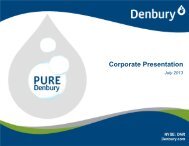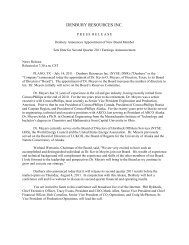Interactive 2009 Annual Report (PDF 7.56 MB) - Denbury Resources ...
Interactive 2009 Annual Report (PDF 7.56 MB) - Denbury Resources ...
Interactive 2009 Annual Report (PDF 7.56 MB) - Denbury Resources ...
- No tags were found...
You also want an ePaper? Increase the reach of your titles
YUMPU automatically turns print PDFs into web optimized ePapers that Google loves.
<strong>Denbury</strong> <strong>Resources</strong> Inc. <strong>2009</strong> <strong>Annual</strong> <strong>Report</strong> 75Note 1. Significant Accounting PoliciesOrganization and Nature of Operations<strong>Denbury</strong> <strong>Resources</strong> Inc. is a Delaware corporation, organized under Delaware General Corporation Law, engaged inthe acquisition, development, operation and exploration of oil and natural gas properties. We have one primarybusiness segment, which is the exploration, development and production of oil and natural gas in the U.S. Gulf Coastregion. We also own the rights to a natural source of carbon dioxide (“CO 2 ”) reserves that we use for injection in ourtertiary oil recovery operations. We also sell some of the CO 2 we produce to Genesis Energy, L.P. (“Genesis”) (see Note3) and to third party industrial users.Principles of <strong>Report</strong>ing and ConsolidationThe consolidated financial statements herein have been prepared in accordance with generally accepted accountingprinciples (“GAAP”) and include the accounts of <strong>Denbury</strong> and its subsidiaries, all of which are wholly owned. A former<strong>Denbury</strong> subsidiary, Genesis Energy, LLC is the general partner of, and together with <strong>Denbury</strong>’s other subsidiaries,owned an aggregate 12% interest in Genesis at December 31, <strong>2009</strong>, a publicly traded master limited partnership. Weaccounted for our 12% ownership interest in Genesis under the equity method of accounting. Even though we hadsignificant influence over the limited partnership in our role as general partner, because our control was limited by theGenesis limited partnership agreement we did not consolidate Genesis. On February 5, 2010, we sold our interestin Genesis Energy, LLC, but we still retain an approximate 10% limited partner interest in Genesis (for which a resaleregistration statement was filed in January 2010) in which we continue to account for under the equity method ofaccounting. See Note 3, “Related Party Transactions – Genesis” for more information regarding our related partytransactions with Genesis and see Note 15, “Subsequent Events” for more information about the sale of our generalpartnership interest. All material intercompany balances and transactions have been eliminated. We have evaluated ourconsolidation of variable interest entities in accordance with “Consolidation” topic of the Financial AccountingStandards Board Codification (“FASC”), and have concluded that we do not have any variable interest entities thatwould require consolidation.Stock SplitOn November 19, 2007, stockholders of <strong>Denbury</strong> <strong>Resources</strong> Inc. approved an amendment to our RestatedCertificate of Incorporation to increase the number of shares of our authorized common stock from 250,000,000 sharesto 600,000,000 shares and to split our common stock on a 2-for-1 basis. Stockholders of record on December 5, 2007,received one additional share of <strong>Denbury</strong> common stock for each share of common stock held at that time.Information pertaining to shares and earnings per share has been retroactively adjusted in the accompanyingfinancial statements and related notes thereto to reflect the stock split, except for the share amounts included on ourConsolidated Balance Sheets and Consolidated Statements of Changes in Stockholders’ Equity, which reflect theactual shares outstanding at each period end.Oil and Natural Gas OperationsCapitalized Costs. We follow the full cost method of accounting for oil and natural gas properties. Under thismethod, all costs related to acquisitions, exploration and development of oil and natural gas reserves are capitalizedand accumulated in a single cost center representing our activities, which are undertaken exclusively in the UnitedStates. Such costs include lease acquisition costs, geological and geophysical expenditures, lease rentals onundeveloped properties, costs of drilling both productive and non-productive wells, capitalized interest on qualifyingprojects, and general and administrative expenses directly related to exploration and development activities, and do notinclude any costs related to production, general corporate overhead or similar activities. Proceeds received fromdisposals are credited against accumulated costs except when the sale represents a significant disposal of reserves, inwhich case a gain or loss is recognized.Depletion and Depreciation. The costs capitalized, including production equipment and future development costs,are depleted or depreciated on the unit-of-production method, based on proved oil and natural gas reserves asdetermined by independent petroleum engineers. Oil and natural gas reserves are converted to equivalent units basedNotes to Consolidated Financial StatementsForm 10-K Part II




